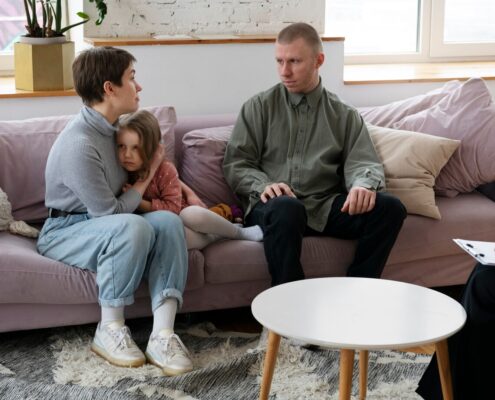Effective Communication Tips for Co-Parenting After Divorce
 Co-parenting after a divorce can be one of the most challenging aspects of transitioning to a new family dynamic. Clear and consistent communication is the foundation for a successful co-parenting arrangement, helping to ensure that your child feels supported and cared for.
Co-parenting after a divorce can be one of the most challenging aspects of transitioning to a new family dynamic. Clear and consistent communication is the foundation for a successful co-parenting arrangement, helping to ensure that your child feels supported and cared for.
To make the process smoother, here are some effective communication tips that can help divorced parents work together more harmoniously. These strategies, plus the help of mediation or counseling when needed, can help you and your ex-partner create a healthy co-parenting relationship for the benefit of your child.
Jump to article sections:
- Communication in Co-Parenting
- Setting Clear Boundaries and Expectations
- Choosing the Best Communication Tools for Co-Parenting
- Resolving Disagreements with Respect and Focus
- Communicating as a Team During Emergencies or Major Decisions
- Keeping Conversations Child-Focused
- How Mediation During Divorce Can Improve Co-Parenting
- Moving Forward
1. Communication in Co-Parenting
Effective communication between co-parents during the divorce process. Divorce often takes a toll on not just the couple but also their children. In order to ensure a smooth transition for the children, it is crucial for co-parents to establish and maintain effective communication during divorce and beyond.
This involves understanding how to talk to your kids about divorce as a team, not as individuals. Additionally, you will need to discuss more than just day-to-day logistics as co-parents but also set clear boundaries and expectations, choose the right communication tools, resolve conflicts respectfully and keep conversations child-focused.
2. Setting Clear Boundaries and Expectations
Setting boundaries may seem difficult after divorce, but it’s a necessity for effective co-parenting. Clear expectations help reduce ambiguity, prevent unnecessary arguments, and define each parent’s role.
When creating boundaries, discuss practical topics like pick-up and drop-off schedules, holiday plans, and rules surrounding communication frequency. Respecting each other’s time and space can help minimize friction while ensuring your child’s needs are consistently met. Remember, your boundaries should be fair and always child-focused.
3. Choosing the Best Communication Tools for Co-Parenting
Using the right tools can significantly improve how you communicate. Many co-parenting apps, like OurFamilyWizard or Cozi, can help you manage schedules, share updates, and avoid miscommunications. These tools create a centralized hub for information, which can be especially helpful when schedules get hectic.
Other helpful tools include online calendars, messaging apps, and shared documents for tracking expenses and important details. Choose what works best for you and your co-parent, and commit to using it consistently to streamline communication.
4. Resolving Disagreements with Respect and Focus
Disagreements are inevitable, but how you approach them can significantly impact your co-parenting relationship. When conflicts arise, strive to keep discussions respectful and solution-focused. Steer clear of revisiting past issues or using accusatory language, as this can heighten tensions and hinder progress.
If emotions begin to escalate, take a moment to pause and return to the conversation when both of you are calmer. For particularly challenging disputes, seeking guidance from a mediator or counselor can provide a neutral space to work through issues constructively. Maintaining mutual respect during conflicts can strengthen your co-parenting efforts and create a better environment for your child.
5. Communicating as a Team During Emergencies or Major Decisions
Emergencies and important decisions, like medical care or education choices, require a team effort. Even if your relationship with your ex-spouse is challenging, these moments call for cooperation and open dialogue.
Agree on how you’ll handle urgent situations in advance to avoid misunderstandings during high-stress moments. Whether it’s deciding how to handle a sudden illness or attending an important school meeting, prioritizing your child’s best interests should guide every discussion.
6. Keeping Conversations Child-Focused
It’s essential to keep all co-parenting conversations centered on your child’s well-being. Avoid discussing lingering relationship issues or other unrelated concerns when communicating about parenting. Not only does this reduce tension, but it also ensures your child remains the priority in every decision you make.
For example, instead of saying, “You never pick up the slack when I need help,” try rephrasing it to, “Can we work out a plan for handling changes in our child’s schedule?” Framing discussions around solutions rather than frustrations can lead to better outcomes for everyone.
7. How Mediation During Divorce Can Improve Co-Parenting
 Mediation during divorce can lay the groundwork for successful co-parenting by fostering collaboration and reducing conflict. It allows both parents to work with a neutral third party to address disagreements, create a parenting plan, and develop communication strategies that prioritize the well-being of their child.
Mediation during divorce can lay the groundwork for successful co-parenting by fostering collaboration and reducing conflict. It allows both parents to work with a neutral third party to address disagreements, create a parenting plan, and develop communication strategies that prioritize the well-being of their child.
The structured format of mediation encourages open dialogue in a non-confrontational setting, helping parents find common ground and establish clear expectations.
For mediation in the Milwaukee, Wisconsin area, trust the team at Ohiku Law. Our experienced mediators and Milwaukee divorce lawyers are dedicated to helping families navigate the challenges of divorce and find solutions that work for everyone involved. Contact us today for a free consultation and let us help you navigate this challenging time with care and expertise!
8. Moving Forward
Co-parenting after divorce comes with its share of challenges, but fostering effective communication can make a world of difference for you and your child. By staying respectful during conflicts, prioritizing your child’s well-being, and working together as a team, you can build a positive and supportive co-parenting relationship.
Remember, you’re not alone in this journey. If you encounter hurdles, don’t hesitate to seek professional guidance or explore additional resources to strengthen your co-parenting skills. Small, consistent efforts can lead to a more harmonious future for your family.
 By Attorney Odalo Ohiku, Owner of Ohiku Law Office
By Attorney Odalo Ohiku, Owner of Ohiku Law Office
Attorney Odalo Ohiku is a dedicated and experienced lawyer who focuses on divorce law, family law, and custody and placement for high-net-worth individuals in the Greater Milwaukee area. A trained mediator and arbitrator, Attorney Ohiku has the skill set, experience, and perspective to help clients safeguard their interests while minimizing the stress, anxiety, and conflict that can come with divorce. Attorney Ohiku’s credentials are exemplary: he has been honored as a “Top 40 under 40” by both The American Society of Legal Advocates and The National Trial Lawyers, served as Chair of the Wisconsin State Bar Board of Governors, and earned the President Award from the Wisconsin State Bar. He is passionate about his work in safeguarding families, ensuring that they can maintain the lives they have worked hard to build.


